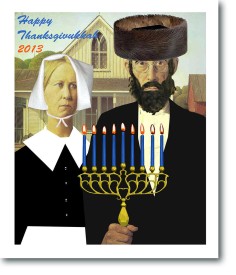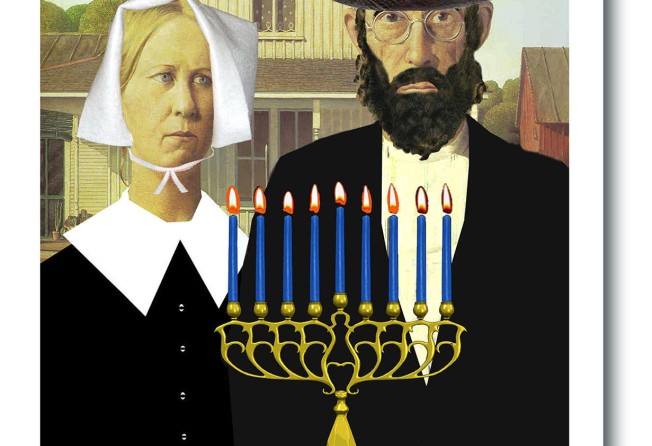
Rare fusion festival of Thanksgiving and Hanukkah has all the trimmings
Party now for Thanksgiving and Hanukkah - or wait 70,000 years

Gobbletov, a hybrid holiday is upon us. On Thursday, the American holiday of Thanksgiving and the start of the Jewish festival of Hanukkah coincide for the first time since 1863. Quantum physicists say this calendric coincidence won't happen again for another 70,000 years, and who's going to argue with those guys?

Dubbed Thanksgivukkah, the fusion festival will see revellers light up turkey menorahs, watch American football in skull caps and feast on cranberry sauce latkes. For one night only, Americans are going kosher and Jews are deep fat frying.
Boston-based social media marketer Dana Gitell first spotted the diary clash in 2012, while driving to work. Before you could say "shalom" she had started a Facebook page, set up a Twitter account and trademarked the name.
Realising this was a once-in-a-lifetime marketing opportunity, as well as festival, Gitell reached out to Jennie Roberts, who runs Jewish merchandise website Modern Tribe.
Thanksgivukkah TM was born, spawning T-shirts, "menurkeys" and even posters - 6,000 items have been sold to date. Roberts has since taken her business out of the basement and hired 10 staff.
Gitell and Roberts aren't the only ones to cash in on the season to be Jewish. Kosher foods retailer Manischewitz is pushing the Eight Days of Leftovers, marketing its normal foods to feasts that mingle American and Jewish cuisines. The 125-year-old company even filmed a rap battle video for its website between a giant turkey and a huge dreidel (four-sided spinning top).
But, oy vey, this is not the only squabble. Liberal Israeli newspaper Haaretz disputes the name Thanksgivukkah altogether, asking why the American holiday's name came first - why not Chanksgiving, it asks? Others challenge the chutpatz of Thanksgiving for squatting on a religious festival.
Shani Brownstein, of the Jewish Women's Association of Hong Kong, says: "We are not doing it. It's quite gimmicky. This is a huge marketing ploy from a few companies and it doesn't have any meaning for me."
But while you might not ask Ramadan and Easter to share a party, Thanksgiving and Hanukkah are, after all, both festivals of feasting. The former celebrates the North American pilgrims' first harvest in the New World, while the Jewish nosh to mark the Feast of Dedication in honour of the rededication of the Holy Temple in Jerusalem in the second century BC.
Roberts is offended by the hostility. "I haven't heard anyone say Thanksgivukkah is insulting to Hanukkah," she says. "The holiday mash-up and products are fun. Never discount joy. It may be one of the best reasons to live."
Others seem to agree. BuzzFeed got on the bandwagon with its own Thanksgivukkah menu that features a Jewish pumpkin pie with a crust made using rye flour and caraway seeds, a noodle kugel with sweet potato and, better still, a turkey stuffed with challah bread.
Mid-Levels resident Jennie Selevan is an American Jew in Hong Kong. Her family celebrates Thanksgiving in a big way every year. "We're from the Deep South and my mom and dad fly over two turkeys," she says. This year, Selevan and her 40 American guests, 80 per cent of whom are Jewish - are embracing Thanksgivukkah, although they are delaying celebrations until Friday to bring Sabbath into the mix.
"We're going to fry our pumpkin pie and the sufganiyah [Israeli doughnut]. It's the perfect way to mix the two festivals," says Selevan. "When the Maccabees thought they only had enough sacred oil to burn candles for one day, it lasted for eight days. Frying our food is a celebration of that oil, and also a tribute to American cooking."
So why has Thanksgivukkah fallen in 2013? The Jewish lunar calendar repeats on a 19-year cycle, and Thanksgiving (always the fourth Thursday in November) follows a seven-year cycle. So technically the holidays should coincide every 133 years.
However, the Jewish calendar is slowly getting out of sync with the solar calendar at a rate of four days per 1,000 years. This means, the Jewish calendar will eventually drift forward out of reach of the Thanksigving parameters, until it catches up with the Gregorian calendar and loops back to where it is now.
So either embrace Thanksgivukkah on Thursday, or wait until the year 79,811!